City Government
Why Vote in the Upcoming Gwinnett County Elections? [May 21]
Published
2 months agoon

On Tuesday, May 21, there will be county-wide elections to choose new judges, school board representatives and party primaries.
For the first time since 1996, the school board District 3 seat (which includes most of Peachtree Corners) is open as Dr. Mary Kay Murphy is not seeking re-election after serving seven terms. Five candidates are running to succeed Dr. Murphy.
There are several open county judicial seats with multiple candidates running. There are also seats open for the Georgia Supreme Court and Court of Appeals.
Since no Republican candidates qualified for the Gwinnett District Attorney race, the winner of the Democratic Primary on May 21, will become the next District Attorney (DA). If the incumbent Patsy Austin-Gatson wins, she will continue as DA for the next four years.
If one of the other two Democratic candidates wins, they will be unopposed in November and will replace Ms. Austin-Gatson in January 2025. Any voter wishing to participate in the Gwinnett DA race would have to vote in the May 21 primary and request a Democratic ballot. If you’re ready for a new DA, waiting until November will be too late.
Where and when to vote
Voting precincts will be open from 7 a.m. to 7 p.m. on Tuesday, May 21. Confirm your registration status and voting location at mvp.sos.ga.gov. You must go to your assigned home precinct to vote on Election Day.
Gwinnett offers in-person early voting every day from 7 a.m. to 7 p.m. through Friday, May 17 at 11 locations around the county. The closest location to Peachtree Corners is at the Pinckneyville Community Recreation Center.
The full list of locations is here. Voters can go to any early voting location, regardless of their home precinct.
Absentee ballots can be requested here and must arrive at the Board of Elections office by 7 p.m. on May 21 to be counted. The ballots can be mailed or put in an official drop box.
Due to changes by the State Legislature, counties are now limited to one drop box per 100,000 registered voters. Consequently, Gwinnett has only six drop boxes for the 2024 elections (as opposed to 23 boxes in 2020). Also drop boxes are not available 24/7, but only during early voting hours. The closest drop box to Peachtree Corners is at the Pinckneyville Community Recreation Center. The full list of drop box locations is here.
Primary Voting is a bit different from voting in the general election in November. You must select one of three ballots:
- Non-Partisan Ballot: only includes the property tax referenda, judicial candidates and the District 3 school board candidates.
- Democratic Party Ballot: includes Democratic candidates for federal, state, and county positions, and the property tax referenda, judicial and school board candidates.
- Republican Party Ballot: includes Republican candidates for federal, state, and county positions, property tax referenda, and the judicial and school board candidates.
Georgia has open primaries and voters do not register by party. You can select either the Democratic or Republican ballot for this primary election, regardless of how you voted in 2022 or prior years. For some races, like Gwinnett District Attorney there are only candidates from one party, so the winner of the primary will be unopposed in November.
View a sample ballot at My Voter Page.
Here are some of the local contested races on which voters in Peachtree Corners can weigh in by voting in the primary. (Many races on both sides of the aisle have only one person running, and are not listed here).
Referenda
Both of the referenda on the May 21 ballot relate to the Homestead Exemption, the reduction in assessed value on a property that serves as the primary residence for the taxpayer. For example, if the assessed value on a residential property in Gwinnett is $200,000 and you claim it as your primary residence, the assessed value is currently reduced by $4,000 to $196,000 for the purposes of calculating your property taxes. The lower assessed value is then multiplied by the millage rate to determine the amount of tax owed.
- Referendum 1: Increase the existing Homestead Exemption from Gwinnett School Taxes from $4,000 to $8,000
- If approved, residential property owners in Gwinnett would see a reduction in school taxes charged on their primary residence of $76.80 per year (based on the current school tax millage rate).
- If rejected, the exemption would remain at $4,000.
- Referendum 2: Create an additional Homestead Exemption from Gwinnett School Taxes of $2,000 just for Public Service Employees
- If approved, “public service employees” (defined as firefighters, paramedics, police officers, teachers and staff of Gwinnett Public Schools, staff of Gwinnett hospitals, and members of the Armed Forces) who reside in Gwinnett would see a reduction in school taxes charged on their primary residence of $38.40 per year (based on the current school tax millage rate).
- If rejected, public service employees would not receive an additional exemption but would continue to receive the same exemption as all other residential property owners.
Note: neither referenda, if passed, would affect county government property taxes or city property taxes. The new exemptions would only apply to school taxes and only to the regular school taxes, not any school taxes related to the repayment of bonds issued by the school system.
Judicial races
- For Superior Court, Kimberly Gallant has received bi-partisan support to succeed retiring Judge Batchelor. Gallant has served on the Municipal Court, Juvenile Court, and State Court.
- Also for Superior Court, Regina Mathews and Tuwanda Rush Willams have received strong recommendations and bi-partisan endorsements to succeed Judge Beyers.
- Incumbent State Court Judge Shawn Bratton has also received similar bi-partisan support in his re-election campaign.
School board
For School Board District 3 (to succeed retiring Dr. Mary Kay Murphy), there are five candidates. This almost guarantees that no one will get a majority in the first round and the top two will advance to a run-off.
The first of the two leading candidates are Yanin Cortes, a graduate of Georgia State, a former teacher at Shiloh High School and a successful entrepreneur for the past 15 years.
The second, is Shana White, a graduate of Wake Forest, Winthrop University and Kennesaw State. White is a third-generation teacher (Summerour MS, Peachtree Ridge HS, Sweetwater MS, Creekland MS, and Pace Academy) and a computer science instruction consultant.
White has earned the endorsement of the Gwinnett County Association of Educators, while Cortes has been endorsed by Dr. Mary Kay Murphy and Peachtree Corners Mayor Mike Mason.
Key Republican primary races
- For District Attorney, there are no Republicans running. The winner of the Democratic primary will be the next DA.
- For County Commission Chair, there are two Republicans running, John Sabic and Justice Nwaigwe. Sabic ran in 2022 for Commission District 2, losing to incumbent Ben Ku. Sabic has been very visible in the community and is now running for Commission Chair. Nwaigwe is a first time candidate, but is also running a strong race.
- For State Senate District 7 (which covers central and eastern Peachtree Corners), four Republican candidates are running: Fred Clayton, Gregory Howard, Louis Ligon, and Clara Richardson-Olguin.
With four candidates, this race will likely go to a run-off between the top two contenders. Richardson-Olguin is running as a small business champion and has received several endorsements from state and local Republicans while Howard has focused his campaign on public safety and education.
The other local Republican races like Congressional District 4, State House Districts 48 and 97, State Senate District 40, and County Commission District 1 only have one Republican candidate each. Those candidates will automatically advance to the November general election.
Key Democratic primary races
- For District Attorney (which prosecutes felony crimes in Gwinnett), career prosecutor Andrea Alabi has received bipartisan support as she seeks to oust Patsy Austin-Gatson. Alabi worked under former DA Danny Porter, has tried over 1,000 cases, and has never lost a single murder case. Alabi has been endorsed by eight mayors in Gwinnett, including Peachtree Corners Mayor Mike Mason. The third candidate is Daryl Manns, a former Assistant District Attorney who worked for Ms. Austin-Gatson until resigning in 2023. With no Republican candidates in this race, the primary winner will be the next District Attorney.
- For County Commission Chair, incumbent Nicole Love Hendrickson faces former state representative Donna McLeod. Hendrickson, first elected in 2020, has been endorsed by 12 Gwinnett mayors including Peachtree Corners Mayor Mike Mason, Norcross Mayor Craig Newton, and Buford Mayor Phillip Beard. Dozens of state legislators have also endorsed Hendrickson.
- For State Senate District 40 (which covers the western edge of Peachtree Corners), incumbent Senator Sally Harrell is opposed by David Lubin. Harrell has served in the Senate since 2018 and has been a strong supporter of the cities in her district, including Peachtree Corners.
The other local Democratic races like Congressional District 4, State House Districts 48 and 97, State Senate District 7, and County Commission District 1, only have one Democratic candidate each. Those candidates will automatically advance to the November general election.
This information was sourced from Peachtree Corners Councilman Eric Christ’s monthly digital newsletter. Sign up for his email list here.
Related
City Government
Southwest Gwinnett Mayors Share Visions for the Future
Published
4 days agoon
July 22, 2024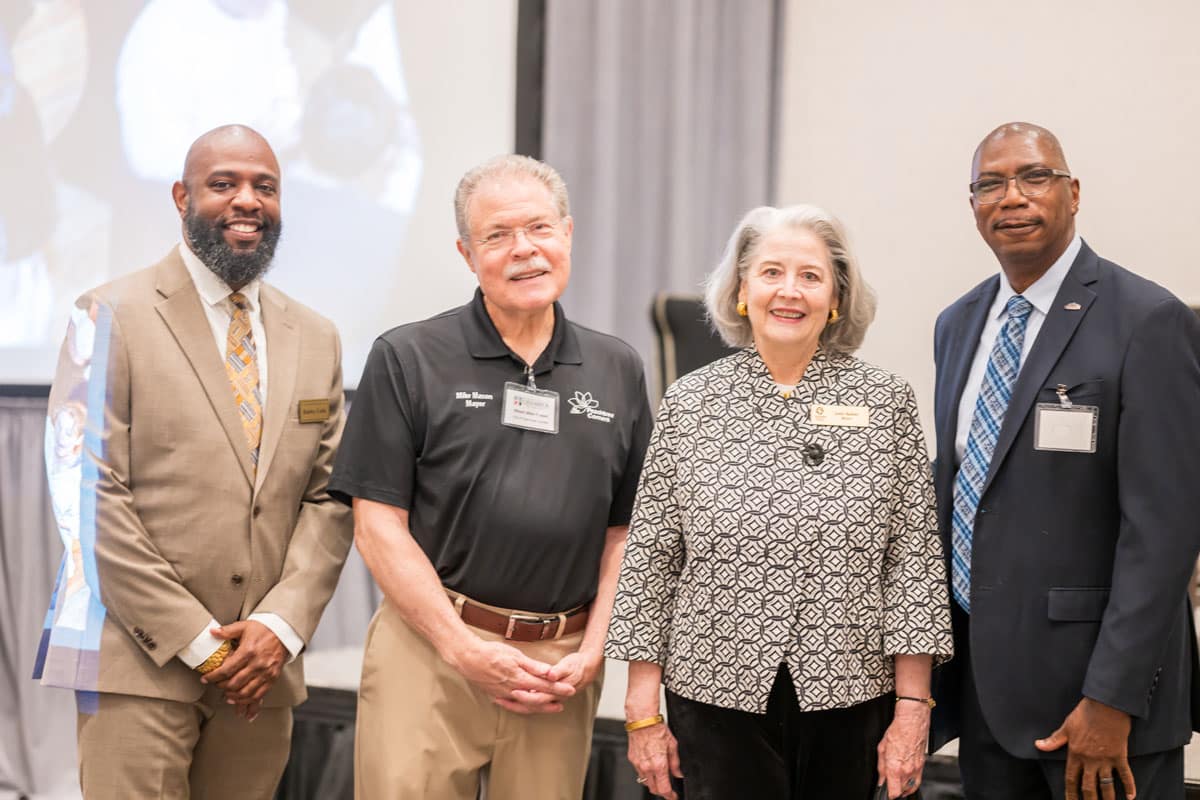
In what has now become tradition, the Southwest Gwinnett Chamber of Commerce hosted mayors from Berkeley Lake, Norcross and Peachtree Corners at a panel discussion on July 12 at the Hilton Atlanta Northeast.
The conversation centered around strategies for revitalizing and expanding metro Atlanta cities, with a focus on redevelopment, zoning ordinance reform, pedestrian and bicycle safety and investing in local schools and affordable housing initiatives.
Zoning changes
“We are beginning a really big project in our city. We have had ordinances that we’ve been working on ever since the city was incorporated in the 1950s,” said Berkeley Lake Mayor Lois Salter.
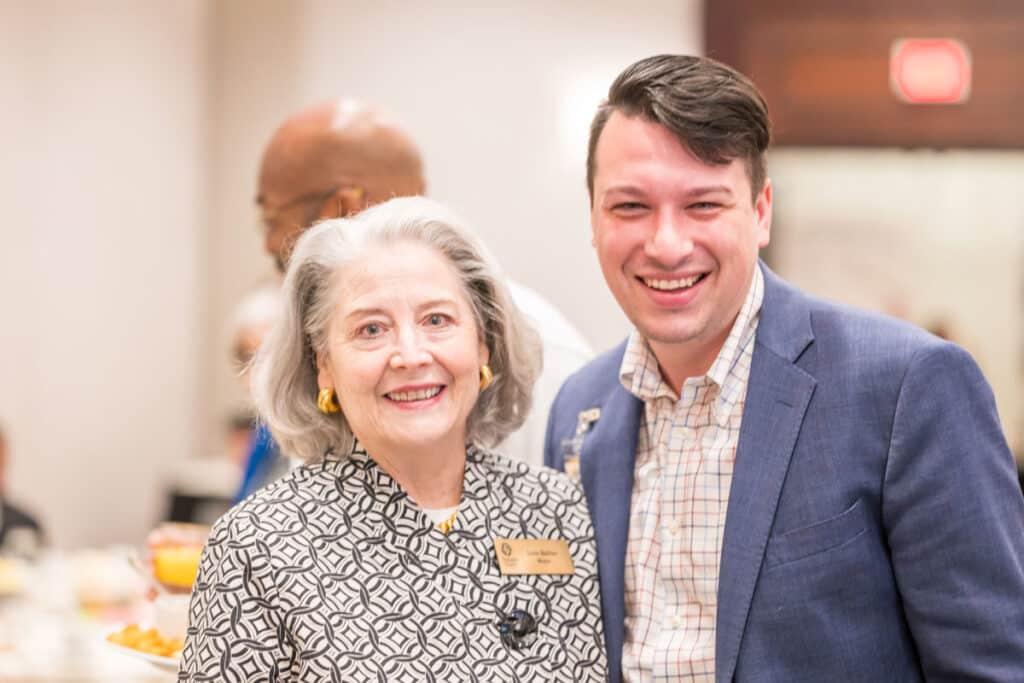
“We feel that we need to overhaul the whole zoning ordinance system and hire a consultant to come and elicit understanding and opinions from our citizens. We want them to be a part of that. We have some folks that resist any kind of regulation. They just want us to regulate their neighbors,” she added.
Norcross Mayor Craig Newton agreed that evolving needs are an important reason to change the zoning, and planning for what lies ahead is paramount. He pointed out that all Georgia cities must implement a comprehensive plan to maintain their qualified local government certifications and remain eligible for selected state funding.
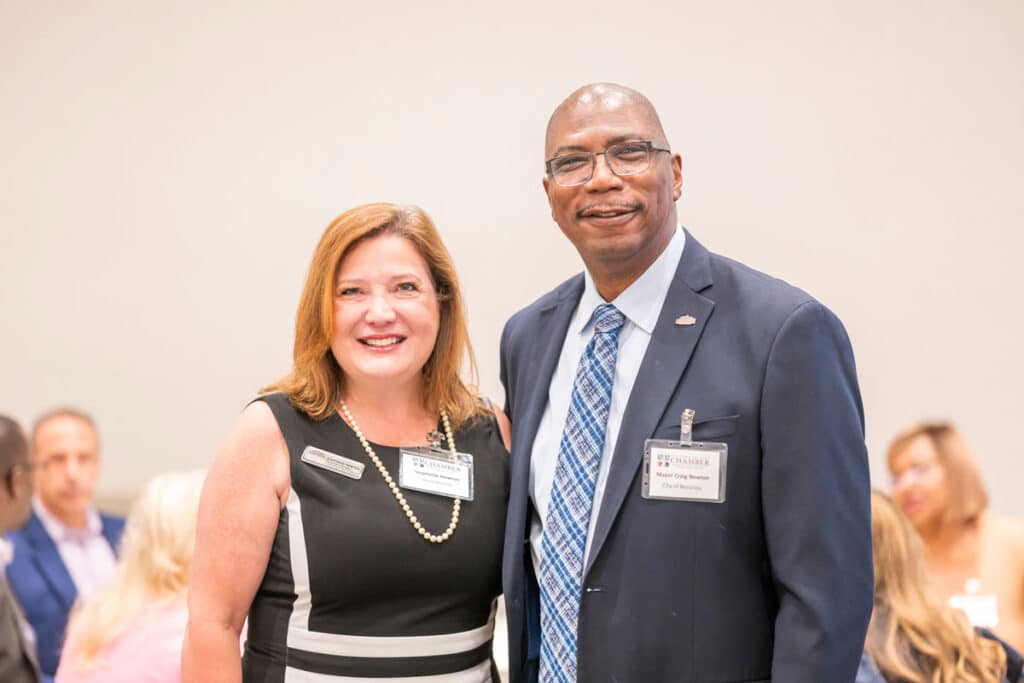
Land development
“We intend to focus on improving pedestrian bicycle safety downtown and establish a sidewalk activity improvement,” he said. “We’re also looking at approving parking in our town center and constructing the Norcross Greenway, which will bring a much-welcomed park, green space and a trail,” he added.
The county announced earlier this year that the project involves redeveloping the existing property into a park that will span almost two acres. It will offer various community spaces, including a multi-use trail, playground, covered picnic area, restroom building and a 41-space parking lot.
In addition to its amenities, a 12-foot-wide concrete trail segment will wind through the park and utility corridor, connecting Singleton Road to Dickens Road.
The trail is part of the 2018 Gwinnett Trails Countywide Trails Master Plan‘s Norcross to Lilburn Trail with an internal loop trail connecting to the neighborhood.
Commercial use
Peachtree Corners has had several “community-friendly” projects come online in the past year, but the effects of the pandemic continue to linger.
“When you think about the future, you’re thinking about the landmass and buildings and commerce. Probably the most significant issue facing a lot of us in the near term is modern office space,” said Peachtree Corners Mayor Mike Mason. “There’s a lot of space. The question is, are people going to come back?”
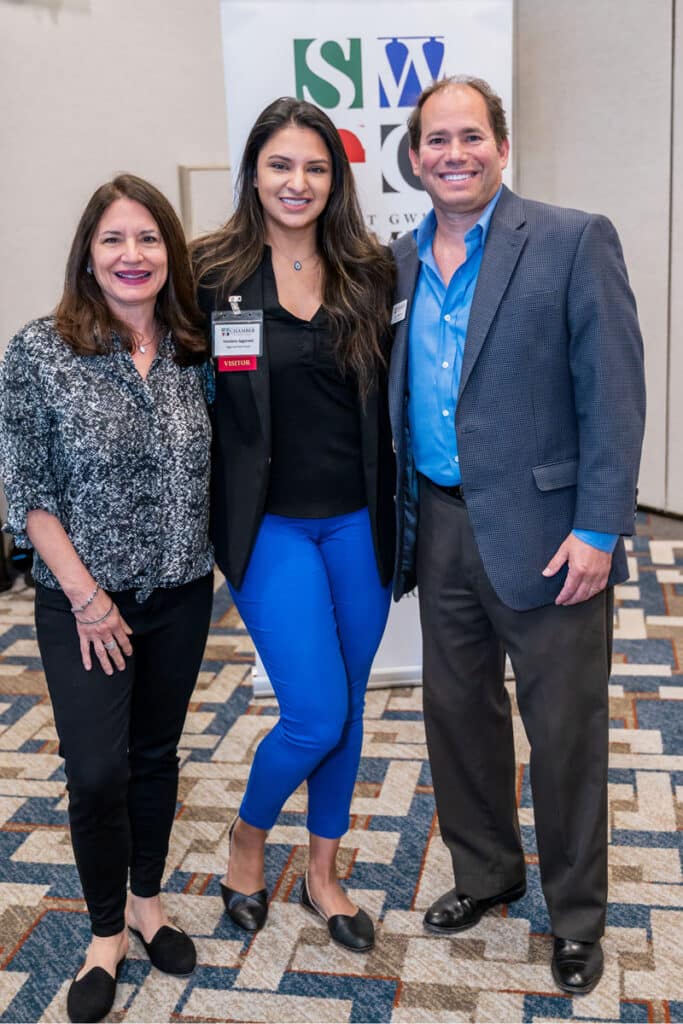
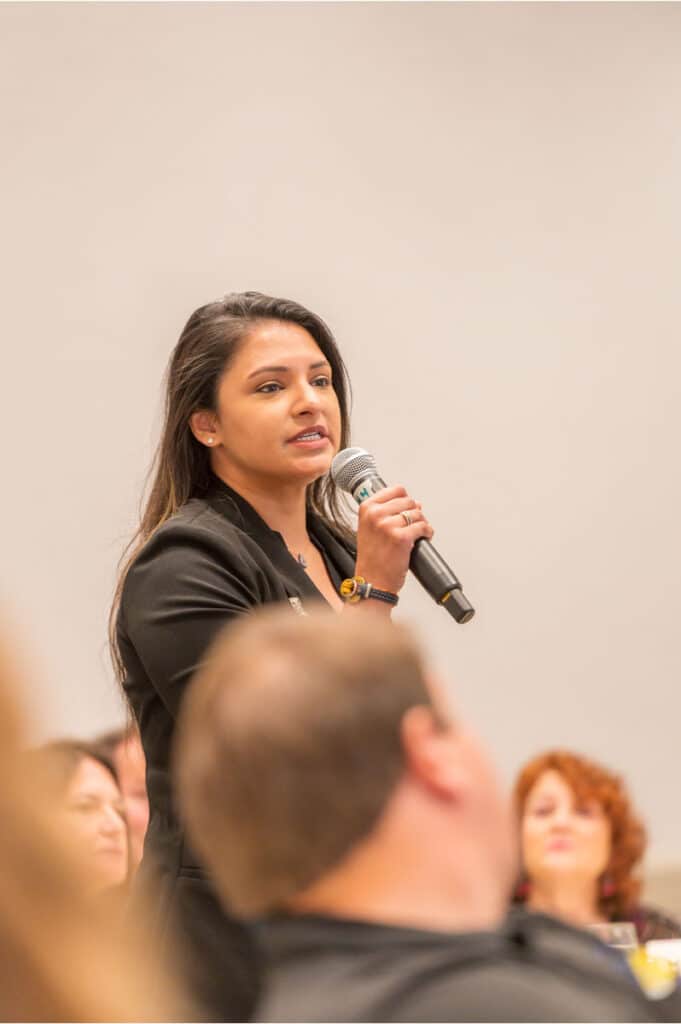
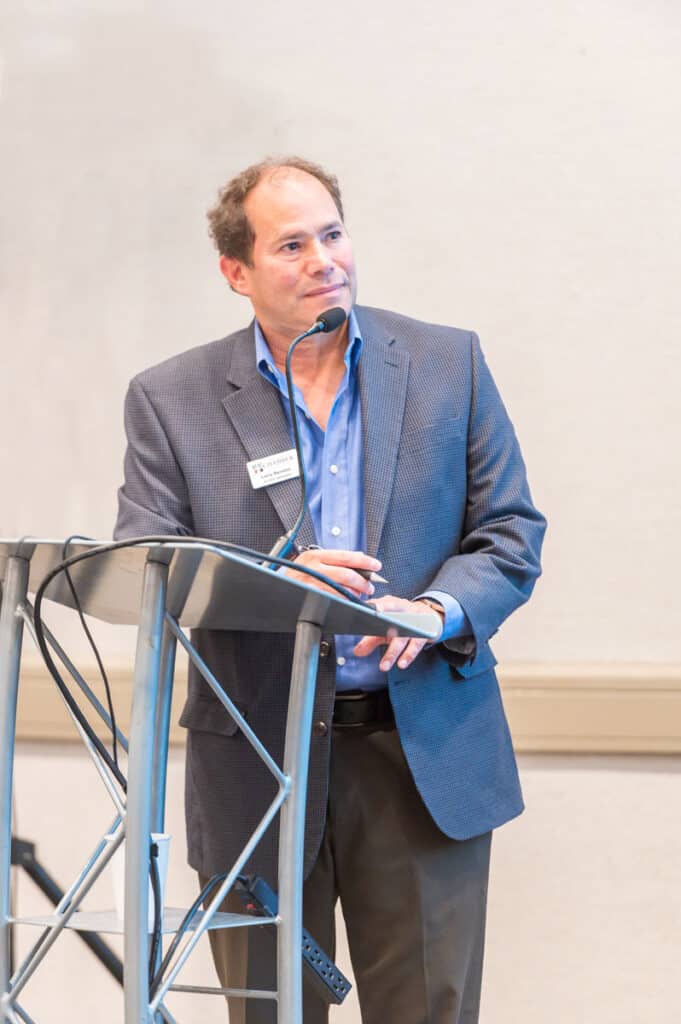
He said that the central retail area has shifted with the revitalization of The Forum and that’s making city leaders rethink city planning.
“We’re having a look at our code and things like that. But from another point of view that will drive the decision about what communities are going to look like,” he said. “For example, there are people coming into the city that say some buildings are technologically obsolete.”
Public safety
Even though Berkeley Lake is the smallest of the three cities and has the highest average home values, all the mayors agreed that public safety is a growing concern.
“Living in Norcross offers residents a dense suburban feel that’s somewhat rural compared to the city of Atlanta,” said Newton. “But some of our public safety initiatives are increasing police presence in high crime areas.”
As the only one of the three cities with a full police department, Norcross is seeking creative ways to implement effective community policing strategies to build trust and communication between law enforcement and the residents.
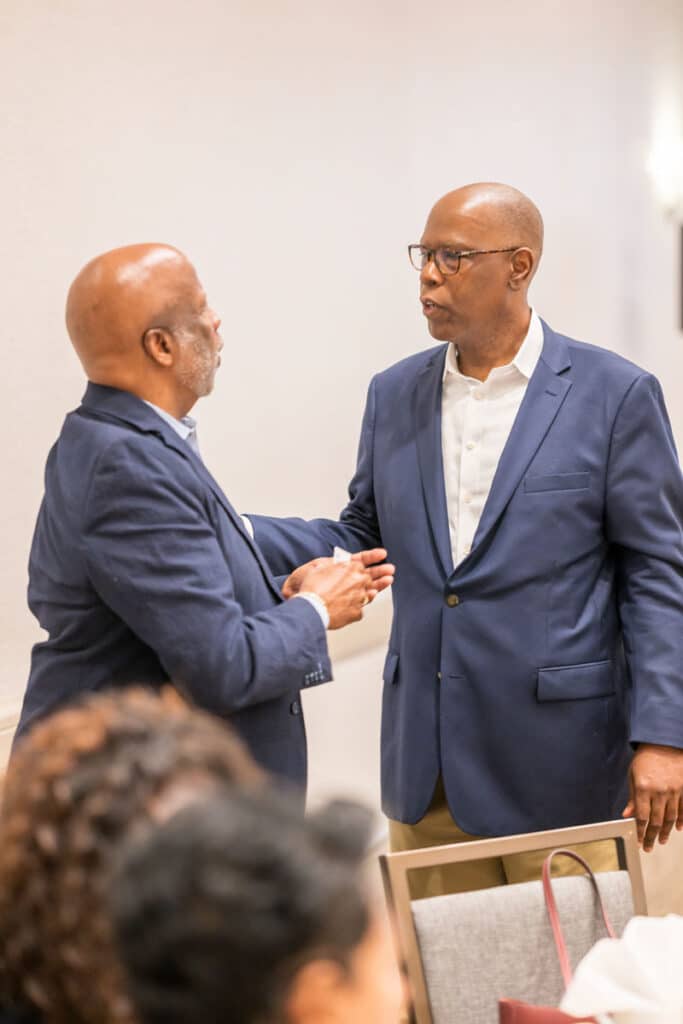
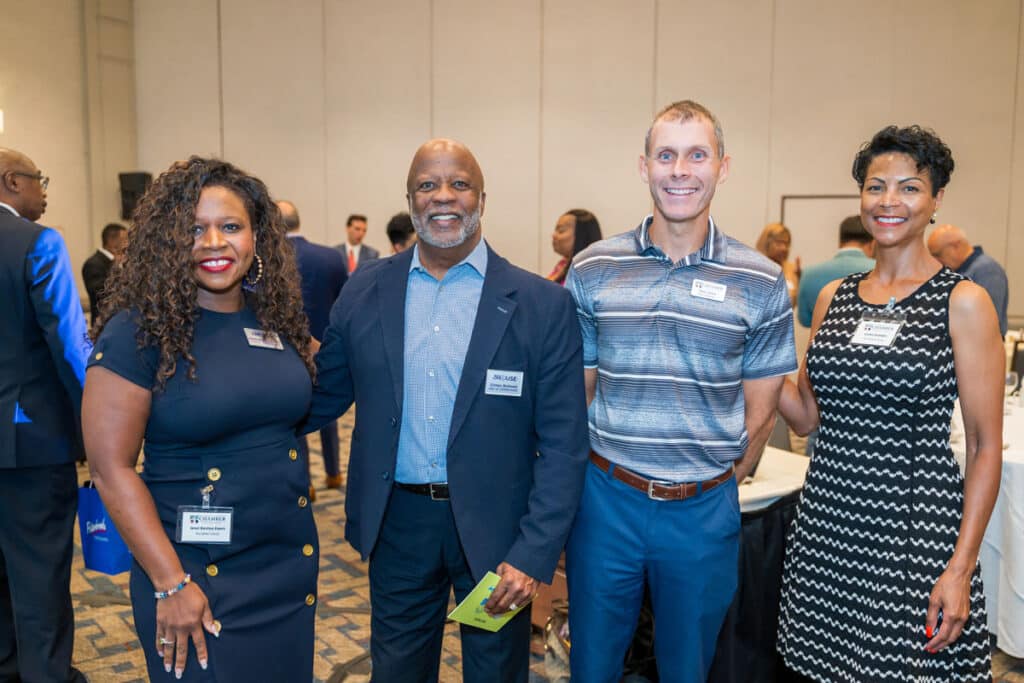
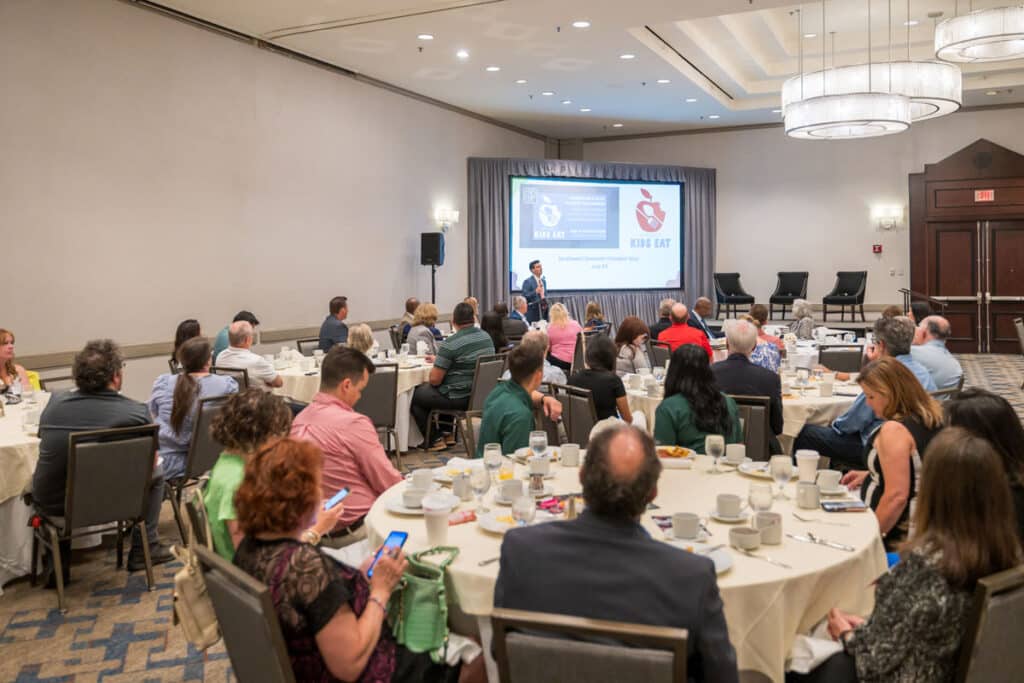
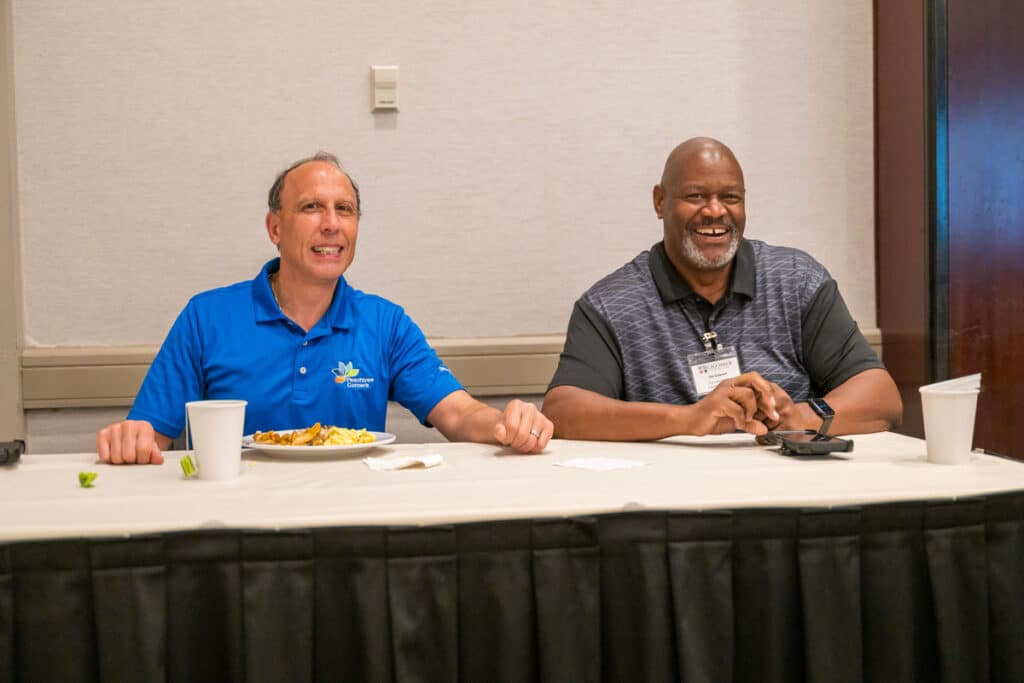
Newton mentioned programs such as Neighborhood Watch, youth outreach programs and educational initiatives along with enhancing emergency response capabilities with training for the local fire department and EMS services.
“Our response time goal is for an officer to be on-site in an emergency within 30 minutes,” he said. “But that doesn’t happen.”
Extended-stay hotels tend to attract crime, so Newton said the city has worked with owners to improve lighting in the public spaces to deter criminal activity.
“We’ve partnered with nonprofit businesses and local stakeholders to support social services employment opportunities for at-risk individuals,” he said. “By working together with various organizations and entities were able to address the complex challenge of public safety.”
Community accountability
With no police force, Berkeley Lake relies heavily on cameras and old-fashioned “knowing your neighbors,” said Salter.
“Some of our individual HOAs are buying and furnishing and paying for cameras to safeguard their neighborhoods,” she said.
Although there may be pockets of criminal behavior around the city, Salter said a police officer once described Berkeley Lake as a “black hole” of crime because there’s so little crime data.
“One of the reasons for that we feel is that historically we’ve been a very neighborly people,” she said. “There is an amazing system of community cohesiveness.”
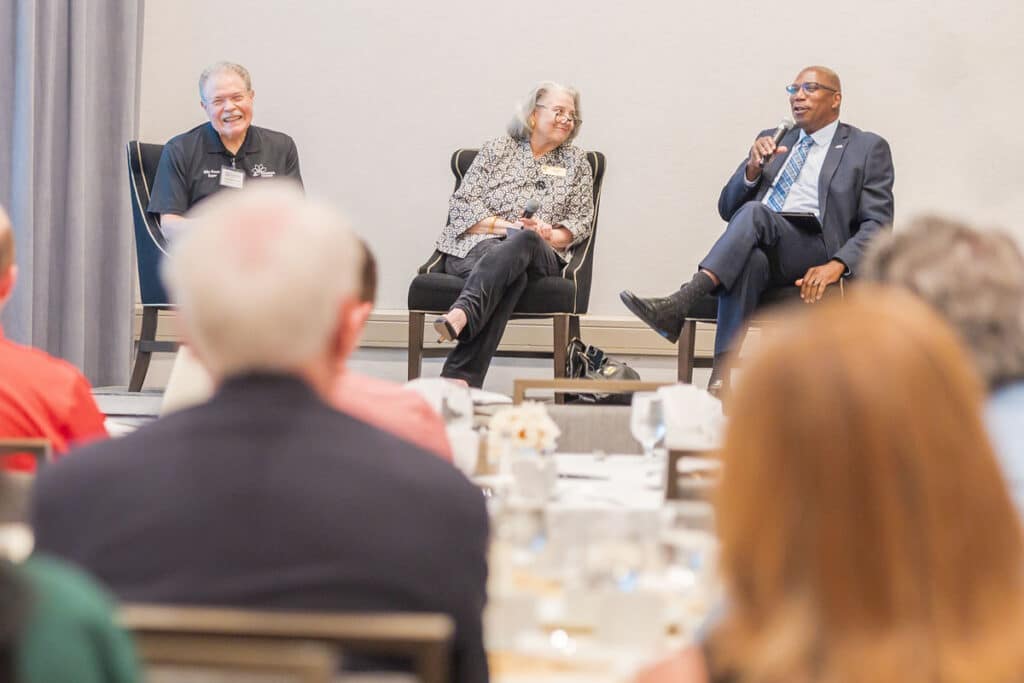
Peachtree Corners is taking its own approach.
“We’ve recently added a Marshal Service and as Lois mentioned we’re also leaning on technology,” said Mason.
The marshal department doesn’t take the place of the services provided by Gwinnett County Police, it primarily enforces city code and aids Gwinnett PD when necessary.
“We’re utilizing as much technology as we can,” said Mason.
Gwinnett PD is instructing where to locate cameras and the city keeps adding them. There have been several instances in the last year or so where coordination among agencies and the use of technology have thwarted or caught criminals.
At the end of the day, the three mayors said the cities all rely on each other. Being so close means that economic development, enhanced entertainment and other desirable amenities are boons for them all.
Related
City Government
Planning and Development is Changing in Peachtree Corners
Published
2 months agoon
June 6, 2024
From Peachtree Corners Mayor Mike Mason’s monthly column.
After the COVID-19 pandemic, the city noticed a development trend that focused on the importance of social interaction. It began seeing development applications for indoor pickleball, virtual racing, garden clubs, car clubs and other recreational uses.
When our city was established in 2012, it adopted Gwinnett County’s codes and ordinances to maintain consistency and these new social interaction-focused uses were not initially considered in the city’s current Comp Plan or zoning code.
Working from home is another market trend having a big impact on local office parks. This economic engine is driven by office parks such as Technology Park and there’s always been a priority placed on preserving office stock.
Even though the commercial office market is waning right now, that pendulum is still trying to figure out where it will settle in. Most of these new socially focused uses find the best home in an office setting.
Due to the increasing number of these applications and the evolving market trends, the city has imposed a six-month moratorium on projects in the Central Business District character area. The moratorium came into effect on May 3 and will end on November 3.
This halt will allow the city six months to pause rezoning applications, special use permits and variances applications for residential or mixed-use development. It will help the city maintain the status quo, stop new applications from coming in and allow for officials to consult with experts and delve deeper into the code and comprehensive plans.
The city plans to conduct extensive research, analysis and strategic planning during this period to help determine if any changes should be made to the comprehensive plan and zoning regulations.
For instance, it might be beneficial to designate downtown as a distinct character area separate from the central business district. Implementing new zoning regulations to transform it into an entertainment district or a unique downtown character area could be a viable option. Many cities have already adopted this type of zoning.
Office parks and businesses throughout the city provide a balance of jobs and residents that allow the city to be the second largest in the state with a zero-millage rate or no city property tax.
Therefore, as part of this process the city will research ways it can preserve, stabilize and enhance the economic engine through the activation of underutilized spaces within office parks.
This proactive approach will help maintain the job-to-resident balance that allows the zero-millage rate while positioning the city for success as the office market pendulum settles.
The most important thing this moratorium does is allow the city to consider what will work best for Peachtree Corners. Furthermore, it communicates to developers that the city requires a pause because current zoning regulations and comprehensive plan do not adequately address future goals.
Related
City Government
Peachtree Corners Welcomes New Community Development Director
Published
2 months agoon
June 2, 2024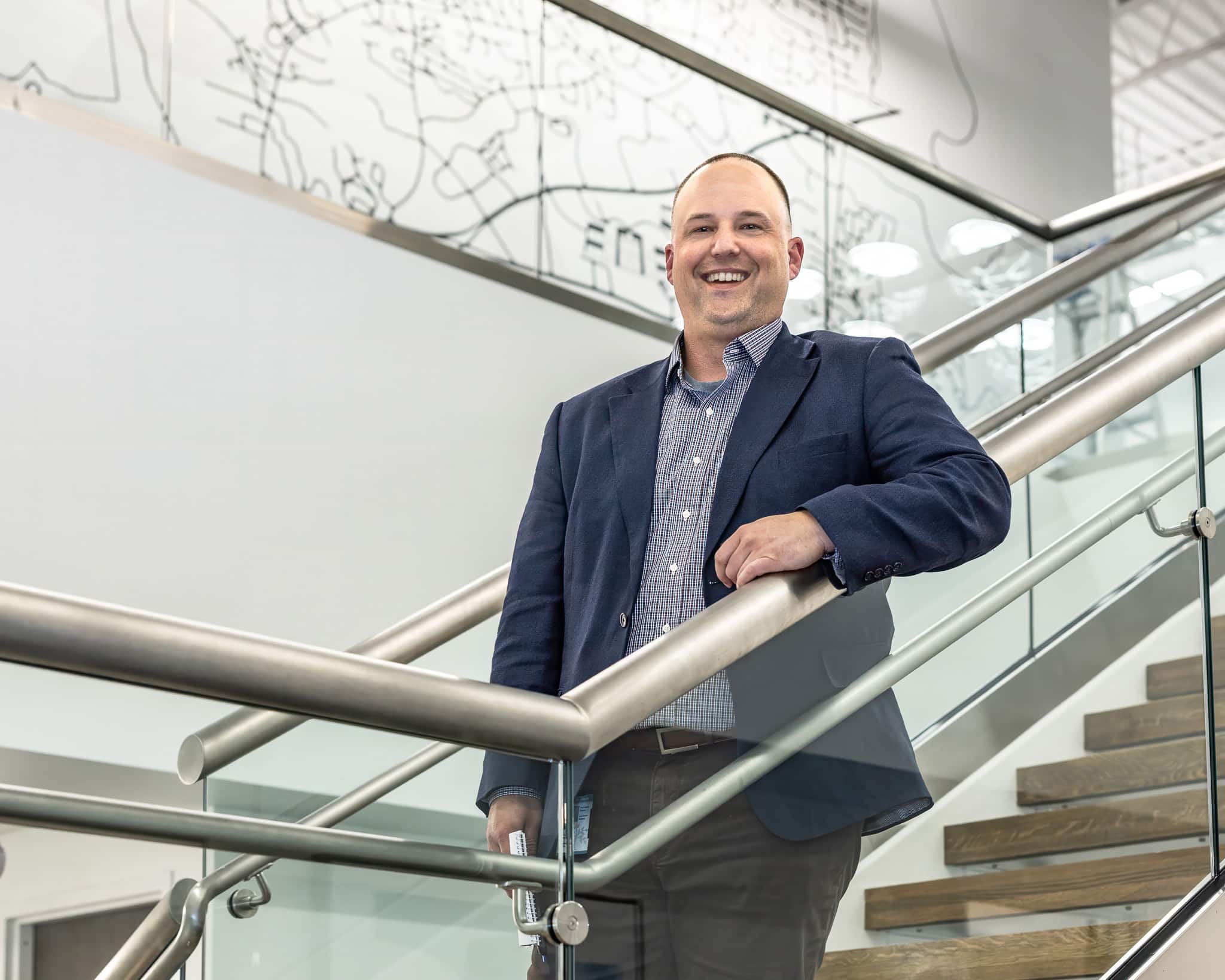
With community development director Diana Wheeler stepping down to pursue a consulting career, Peachtree Corners city leadership turned a challenge into an opportunity.
In January, Shaun Adams was hired as the assistant city attorney to oversee compliance for land use and economic development-related matters and help with legal issues.
His background in public and private sector development made him the ideal replacement.
As luck would have it, Adams moved to Georgia in 2005, selling real estate while attending law school.
“I actually started working down at the capital a lot, lobbying on various policies right out of law school,” he said. “I was the legal counsel for the Senate Judiciary, and that exposed me to ACCG, which is the State County Association, which represents all staff and elected officials for counties across the state.”
With the motto, Advancing Georgia’s Counties, ACCG helps with the policy aspect of things like training and education.
“While I was a lobbyist for them, I focused on economic development, infrastructure-related issues and whatever policies went into place,” Adams said. “We also went around the state and trained our commissioners and their staff on some of those policies and put their new processes in place.”
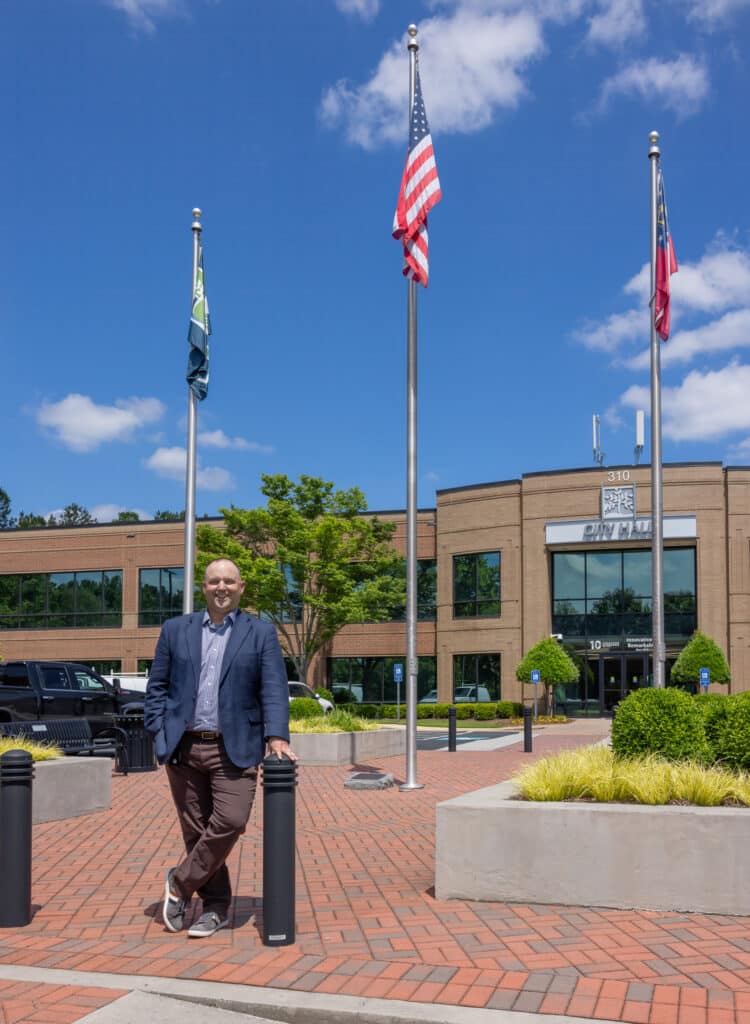
Local government possibilities
“After a handful of years, I got lured away into the private sector,” he said.
Working on land use and government relations matters from the other side of the table, Adams represented developers and investors.
“Sometimes [investors would] come to me with a property that they bought, and they’d say, ‘Hey, we bought this on investment. We’d like to see how we can make the highest and best use of it. Help us create a vision,’” he said. “So, I helped put a team together to determine what we thought could go on the site based off of local government zoning.”
His job entailed working with architects and engineers to design the site and help the client take it to market. Ultimately, the contract purchaser would come in and seek needed entitlements.
“I would help with that,” Adams said. “Those were the fun ones because you got to start on the ground.”
Adams got to know many different local government jurisdictions and worked extensively around metro Atlanta on various matters. On a busy week, he may work with five different jurisdictions across the state.
As a family man with a wife and two sons, he began looking for something that would keep him closer to home.
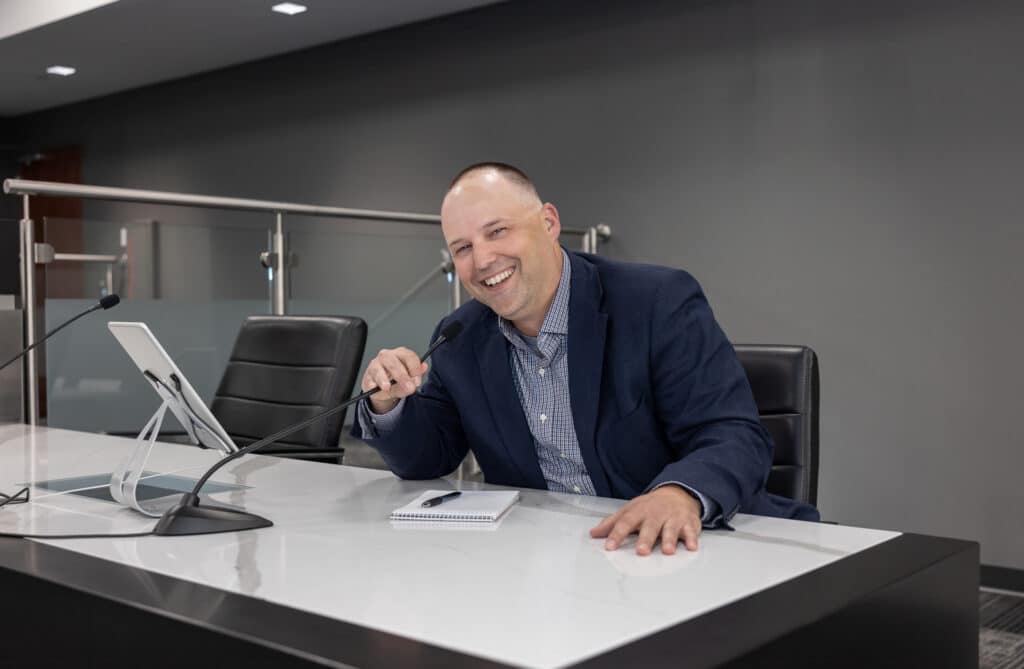
A perfect fit
City Manager Brian Johnson says it was serendipitous that Adams was looking for a position at a time when the city needed someone like him.
“It’s actually a hard position to fill, and I just happened to catch him,” said Johnson. “We were familiar with each other because he’s represented a number of clients coming before the city.”
Johnson said that Adams was legal counsel for some of the most significant developments in the last few years: North American Properties purchasing and revitalizing The Forum, housing development Waterside, and Intuitive Surgical moving its headquarters from the West Coast.
“He was on the other side of the table as we worked together to make these projects ultimately better for the city and better than they were upon their initial submittal,” Johnson said.
“And I knew then that he was a really knowledgeable guy that really knows how to deal with people. He’s a problem solver. He’s always looking for ways to figure out how to resolve conflict and navigate minefields as it relates to land use and all the laws and zoning that apply to it,” he added.
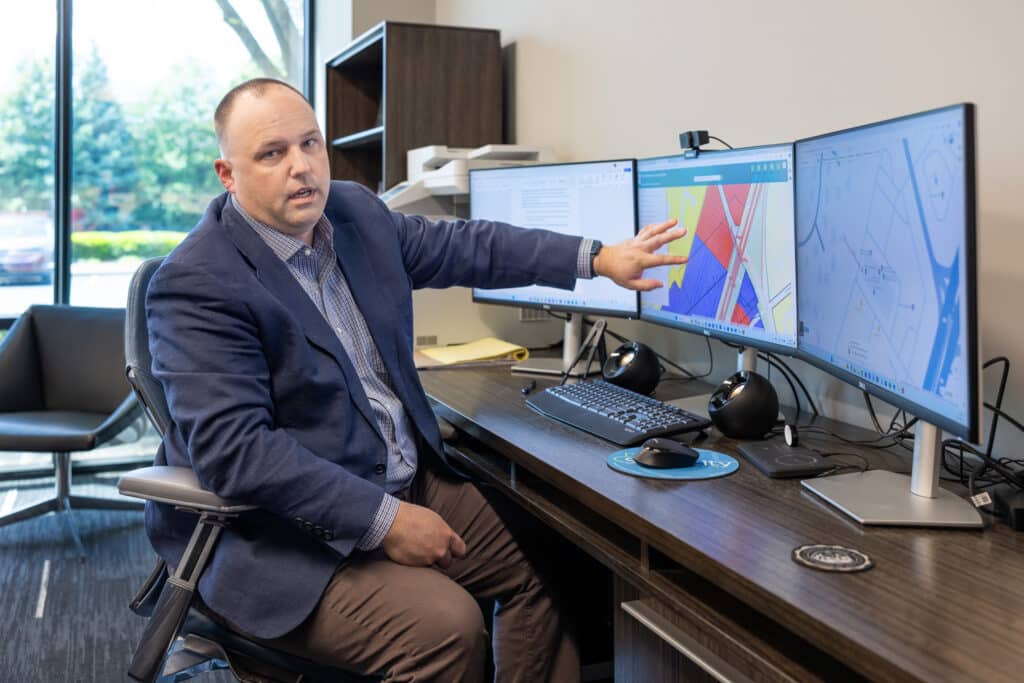
Changes to the job
Although Wheeler is no longer a staffer, she’s still doing work for the city.
With Adams’ legal background, the events planning team will be transitioning out from under community development.
“By taking that off my plate, it’ll allow me to do more with the legal side of things that the position didn’t do previously,” he said.
There will also be a shift with code enforcement duties moving under Chief Marshal Edward Restrepo.
“I moved code enforcement underneath the city marshal’s office because code enforcement and law enforcement are almost like fraternal twins — they both do very similar things,” said Johnson. “Each of them is enforcing a different level of law. Code enforcement is municipal code, and law enforcement is state code, but they work hand in hand.”
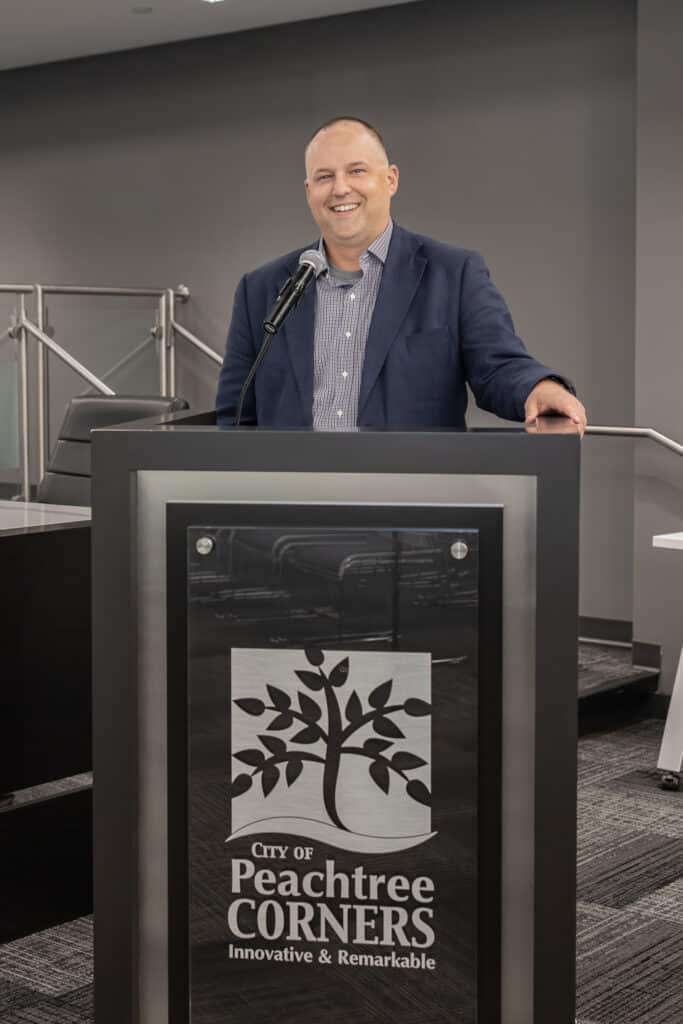
The events planning through the end of the year has already been moved from the community development director’s department. As a consultant, Wheeler will work with other contractors to manage the happenings at the Town Center. Director of Communications Louis Svehla has already moved into managing premier events, Johnson said adding that the city may use more consultants in the future under Svehla’s management.
“He has really shown his ability to manage special events very adeptly. He really showed me that skill set when we had last year’s Criterium bike race,” said Johnson. “I decided to take advantage of some opportunities, including our partnership with Audi, which we were going to announce to the whole vulnerable road user thing.”
With only three months to prepare, Svehla pulled off the event without a hitch.
“He did an outstanding job and so he is capable of taking the management of our community events, our concerts and stuff,” said Johnson.
Johnson said the city is still utilizing consultants for some aspects of special events, but if consultant fees become more expensive than hiring someone full-time to assist Svehla, he’ll make that call.
“All those moves have happened, and I’ll sum it up by just saying that I’m just playing to the strengths of these people and utilizing a great team that I have, and it’s working out really well,” Johnson said.
Related
Read the Digital Edition
Subscribe
Keep Up With Peachtree Corners News
Join our mailing list to receive the latest news and updates from our team.
You have Successfully Subscribed!

What’s going on at Jones Bridge Park and the Challenges of Urban Development

Taste of Peachtree Corners: PCBA Showcases Local Restaurants

The Forum Gives Sneak Peek of New Eateries and Community Spaces

Southwest Gwinnett Mayors Share Visions for the Future

8 Events Happening In and Around Peachtree Corners This August

Peachtree Corners Shines Bright with Light Up the Corners Glow Race this August

Peachtree Corners Shines Bright with Light Up the Corners Glow Race this August

The Forum Gives Sneak Peek of New Eateries and Community Spaces

8 Events Happening In and Around Peachtree Corners This August

Southwest Gwinnett Mayors Share Visions for the Future

Taste of Peachtree Corners: PCBA Showcases Local Restaurants

What’s going on at Jones Bridge Park and the Challenges of Urban Development

Local Resident Opens AtWork Location in Peachtree Corners

CHRIS 180 Expands its Services into Gwinnett County [Podcast]

Light up the Corners [Video]

Capitalist Sage: Business Leadership in Your Community [Podcast]

Cliff Bramble: A Culinary Adventure through Italy

Top 10 Brunch Places in Gwinnett County

A Hunger for Hospitality

THE CORNERS EPISODE 3 – BLAXICAN PART 1

Top 10 Indoor Things To Do This Winter

The ED Hour: What it takes to Remove Barriers from Education
Peachtree Corners Life
Topics and Categories
Trending
-
Business1 week ago
Taste of Peachtree Corners: PCBA Showcases Local Restaurants
-
Business2 days ago
The Forum Gives Sneak Peek of New Eateries and Community Spaces
-
City Government4 days ago
Southwest Gwinnett Mayors Share Visions for the Future
-
Around Atlanta4 days ago
8 Events Happening In and Around Peachtree Corners This August







